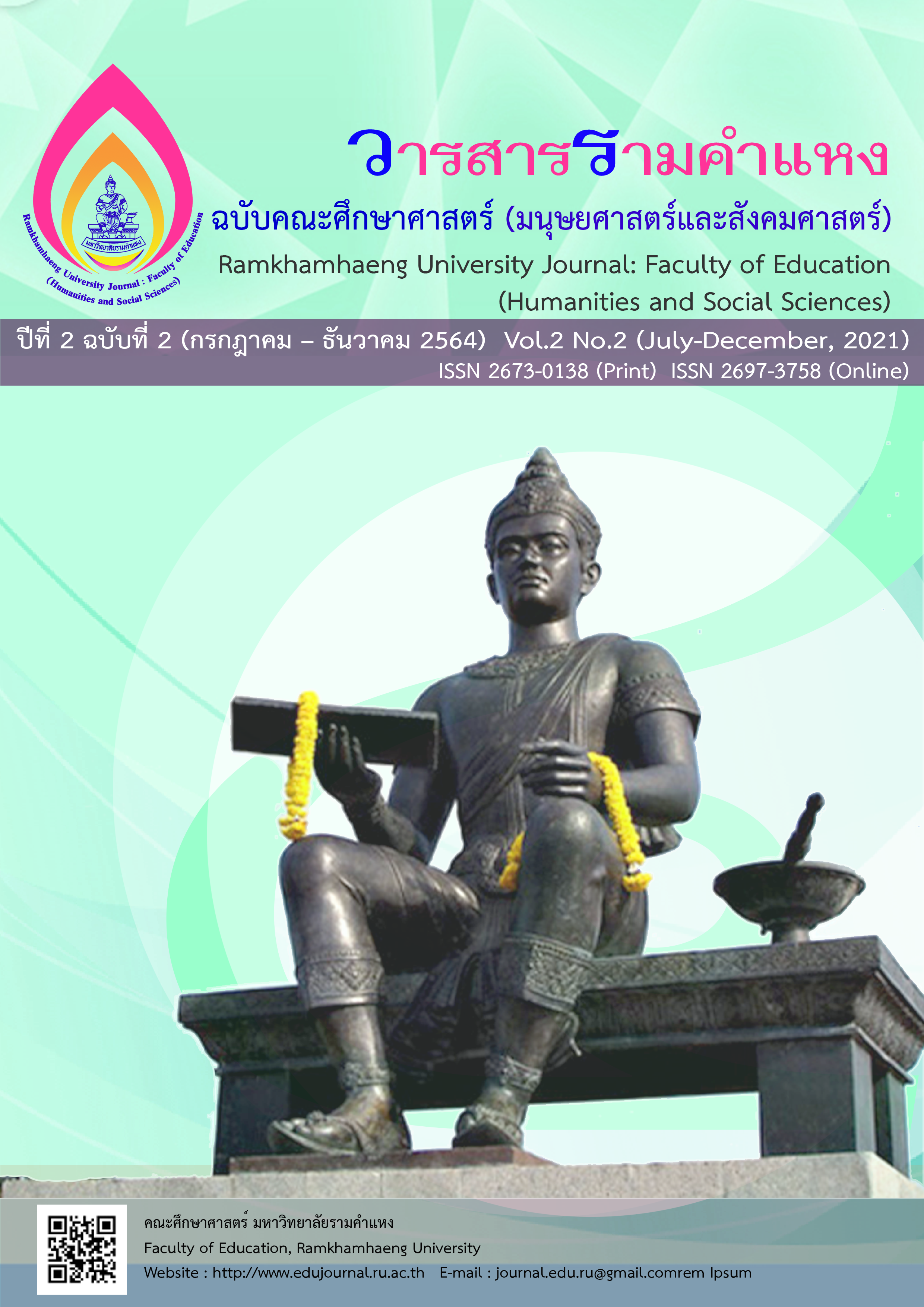Factors Related to Food Consumption Behaviors of Students at the Demonstration School, Ramkhamhaeng University, Bangkok
Main Article Content
Abstract
This research aimed (1) to study personal factors, predisposing factors, enabling factors, reinforcing factors and food consumption behaviors of the students of the Demonstration School, Ramkhamhaeng University, Bangkok and (2) to study the relationships between personal factors, predisposing factors, enabling factors, reinforcing factors and food consumption behaviors of the students of the Demonstration School, Ramkhamhaeng University.
This study was a cross-sectional survey research using the sample group of 160 students in Mathayom Suksa 2 from the Demonstration School, Ramkhamhaeng University. The data were collected during 11-18 February, 2019. The instrument used in this research was a questionnaire which its contents were divided into 5 parts: personal information, predisposing factors (knowledge, and attitude towards food consumptions), enabling factors (access to, and food and beverage distribution facilities), reinforcing factors (received information and social support), and food consumption behaviors. The whole questionnaire had the reliability of 0.701. Data were analyzed using descriptive statistics, percent, mean, and standard deviation. Also, correlations were analyzed by using Chi-square test and Pearson's product moment correlation method.
The research found that most sample was male (55.60 percent). About 60 percent of their parents' occupations were trade and business, with the average monthly income between 20,000- 80,000 Baht per month. Students received money from parents per day were between 80-120 Baht. They had knowledges and attitudes concerning healthy food consumption at a low level. Meanwhile, the enabling, reinforcing factors and food consumption behaviors of the students were at a high level. There was no relationship between parents' occupations and food consumption behaviors of the students (p > .05). Gender associated with food consumption behaviors. Average family income per month and students' money received per day were statistically correlated to food consumption behaviors (r = 0.214, r = 0.288, respectively), with significance level at p < .01. Knowledge and attitude were correlated to food consumption behaviors (r = 0.379, r = -0.671, respectively), with significance level at p < .01. There were relationships between enabling factors, reinforcing factors and food consumption behaviors (r = -0.379, r = 0.933, respectively) with statistical significance at p < .01.
The results of this research had suggestion that the school, cooperated with student's fathers and mothers or parents, should develop activities in school nutritional promotion, especially emphasizing in nutritional contents, awareness of food consumption, and recommendation of buying good healthy foods. There were, also, training and skill activities with demonstration to the students in selecting and buying good healthy foods and beverages for their health.
Downloads
Article Details

This work is licensed under a Creative Commons Attribution-NonCommercial-NoDerivatives 4.0 International License.
ผู้ส่งบทความ (และคณะผู้วิจัยทุกคน) ตระหนักและปฎิบัติตามจริยธรรมการวิจัยอย่างเคร่งครัด ทั้งนี้บทความ เนื้อหา ข้อมูล ข้อความ ภาพ ตาราง แผนภาพ แผนผัง หรือข้อคิดเห็นใดๆ ที่ปรากฎในบทความ เป็นความคิดเห็นและความรับผิดชอบของผู้ส่งบทความ กองบรรณาธิการไม่จำเป็นต้องเห็นตามเสมอไป และไม่มีส่วนรับผิดชอบใดๆ โดยถือเป็นความรับผิดของของเจ้าของบทความเพียงผู้เดียว
References
Choopayak, C. (2012). Research, knowledge, attitude and dietary habits of high school students: Schools under the ministry of university affairs in Bangkok. Bangkok: Ramkhamhaeng University, Faculty of Education.
Kunthawong, O. (2011). Healthy habits regarding food consumption of national health and nutrition act of grade 1 students, the school expanded educational opportunities department of education Bangkok. Unpublished master's thesis, Srinakharinwirot University, Bangkok.
Muhummhud, S. (2011). Factors influencing eating habits of high school students, schools under the department of education in Dusit, Bangkok. Unpublished master's thesis, Srinakharinwirot University, Bangkok.
Muktapun, B. (2009). Nutrition for different ages. Khonkaen: Khon Kaen University, Faculty of Public Health.
Ramkhamhaeng university demonstration school. (2019). The statistical data of students in 2019, Bangkok: Author.
Sastranuwat, S. (2011). Alternative: Health behavior concerning food consuming of mathayom suksa students in the secondary school under the jurisdicting of the department of general education Amphur Muang Changwat Chumphon. Unpublished master's thesis, Srinakharinwirot University, Bangkok.
Thamtistan, C. (2010). Health behavior on the consumption of foods high school students Nawaminthrachinuthit Rachinuthit Satriwithaya 2 department of general education. Unpublished master's thesis, Srinakharinwirot University, Bangkok.
Vorapongsathorn, T., & Vorapongsathorn, S. (2018). Sample size calculation for research using G* Power program. Journal of Health Promotion and Environmental Health, 41(2), 11-21.
Vorapongsathorn, S. (2015). Research in education (3rd ed.). Bangkok: Vitoon Kampok Printing.
Wongthong, O. (2003). Family nutrition. Bangkok: Kasetsart University, Department of Home Economic.
Wuthiwai, N. (2008). Dietary pattern, lifestyle and nutritional status of health science university students in Bangkok. Bangkok: Mahidol University, Faculty of Tropical Medicine.


